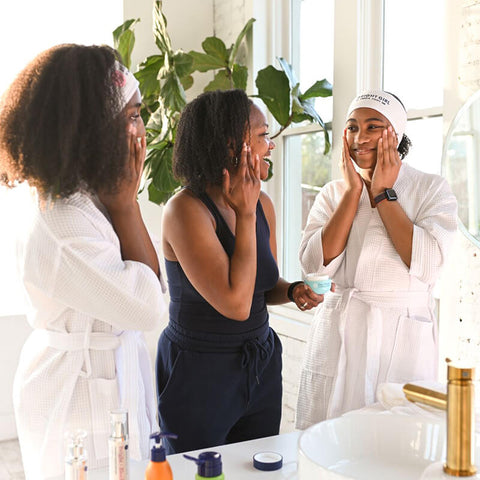
Ingredients to AVOID in Tween Skincare
As the mother of 3 teen/tween daughters, I field questions daily from my own girls about how to best care for their skin. As a double board-certified Dermatologist, I have become the "go-to" source for friends, parents, and neighbors about what products are safe for tween skin.
Watch this quick video on the importance of pH-balanced skincare
Why are tweens so skincare-obsessed? I experience this both through the lens of a Dermatologist, caring for my patients, and as a mom myself. This is what I've surmised:
- Social media has introduced young people to a new world of skincare advice. Social can be helpful in raising awareness but may also be harmful in spreading false information.
- I have seen the impact of influencers, firsthand, in my own daughters (ages 15, 12, and 9) who are undoubtedly affected by what influencers are using. Skin is very different in our pre-pubescent, tween, and teen years compared to our more mature years. Skincare should be tailored accordingly.
- In the field of dermatology, there is consensus on the importance of consistent use of skincare products that are age-appropriate for young skin.
- Effective skincare products and daily routines help treat skin conditions such as acne, eczema, and sensitive skin; these conditions are common in the pediatric and adolescent population.
- Skincare should be pH-balanced, nourish a healthy skin microbiome, and support the skin barrier.
- Skincare for teens/tweens should incorporate actives that are clinically-proven to hydrate, settle inflammation, and balance oil production.
- There is a lack of high-quality skincare brands that speak to Gen Z and Gen alpha. Recognizing this, and drawing on my own experience as a double-board certified dermatologist and mother of 3 daughters, I developed Bright Girl skincare.
- Bright Girl incorporates clinically-proven actives that are safe for young skin. Our formulations are pH-balanced and backed by science.
- I strongly believe that we can create a movement of skin health through consistent daily habits and education that will prevent a large majority of skin damage seen in dermatology offices.
- Thankfully, there are also many board-certified dermatologists that have established a presence on social media and are sharing evidence-based information and wisdom acquired from years in practice.
What "actives" should we avoid in tween skincare products:
- Products that contain exfoliating beads, scrubs, grounds, or particles. These physical exfoliants can actually create microscopic tears in the skin barrier, causing irritation and redness and potentially allowing harmful bacteria and other irritants to enter the skin.
- Strong antioxidants such as high concentrations of vitamin C that are designed to combat skin damage in more mature skin: the simple truth is that youthful skin does not require these intense and powerful treatments.
- Alpha-hydroxy acids such as glycolic acid, malic acid, lactic acid, citric acid, and tartaric acid: although these ingredients are helpful or harmless when used in lighter concentrations or small amounts, overuse can lead to redness, irritation, and inflammation of the skin. There are many AHA-containing products on the market that are geared for mature skin; these formulations can strip the skin barrier and lead to blotchiness in young skin.
- Beta-hydroxy acids such as salicylic acid, tropic acid, and beta-hydroxybutanoic acid: products with these ingredients are often geared towards treating fine lines and wrinkles...definitely not necessary for young skin.
My professional opinion is that young people need to avoid retinoids or retinols if they have acne-prone skin. Retinols and retinoids have long been established as an effective treatment for acne. Likewise, glycolic acid and salicylic acid have a long track record of helping acne lesions and oily skin. The key is making sure that these actives are paired with the proper skincare regimen to hydrate the skin, feed the skin microbiome, and strengthen the skin barrier. This ideal skincare regimen includes: pH-balanced face cleanser, effective moisturizer, and a mineral-based sunscreen. The optimal moisturizer contains humectants that draw water and hydration into the skin, occlusives that prevent trans-epidermal water loss, and emollients that help seal the connections between skin cells.
I hope that this guide helps you when selecting the safest and best tween skincare!




